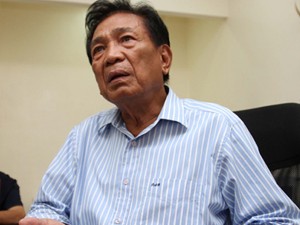Detained former Commission on Elections (Comelec) chief Benjamin Abalos is free to go to Taiwan to purchase milkfish fingerlings for his aquaculture business, a Pasay court ruled.
Pasay Regional Trial Court Branch 112 Judge Jesus Mupas on Thursday granted Abalos’ motion to travel to Taiwan from Jan. 28 to Feb. 1 on condition that he post a cash bond of P200,000, court spokesperson Felda Domingo said.
Abalos is facing two counts of electoral sabotage for allegedly conspiring to rig the 2007 senatorial elections to favor the allies of former President Gloria Macapagal-Arroyo.
Last year, the Pasay court already allowed Abalos to leave for Taiwan from Nov. 27 to 30, but Abalos rescheduled the trip to renew his passport, which was about to expire, and refiled his motion to travel.
Earlier, he was also allowed to make the Taiwan trip by Pasay RTC 117 under Judge Eugene de la Cruz, which is hearing his electoral sabotage cases and the Sandiganbayan Fourth Division, which is hearing graft charges against him in connection with the controversial $329 million National Broadband Network-ZTE Corp. deal.
Also named in the NBN-ZTE case are former President Arroyo, former First Gentleman Jose Miguel Arroyo and former Department of Transportation and Communications Secretary Leandro Mendoza.
Last Tuesday, the former President has appealed anew to the Sandiganbayan to dismiss the graft charges filed against her for the NBN-ZTE deal.
The Sandiganbayan has already rejected last December Arroyo’s claim that there was no crime because no deal was consummated.
In a 16-page motion filed with the Sandiganbayan Fourth Division antigraft court, Arroyo’s legal counsel Jose B. Flaminiano said the charges filed against Arroyo “do not constitute the offense.”
The NBN-ZTE deal was dropped even before it began at the height of a Senate probe in 2007 on allegations that the Chinese telecom giant bribed its way to get the deal.
“In contemplation of law, nonexistent, as if no contract was ever executed. Hence the second element of the crime—that the public officers entered into a contract on behalf of the government—is absent,” Flaminiano said.
The lawyer maintained that the Sandiganbayan had no jurisdiction over the case because the main element of the case or the act of entering into a contract, was not done in the Philippines.
